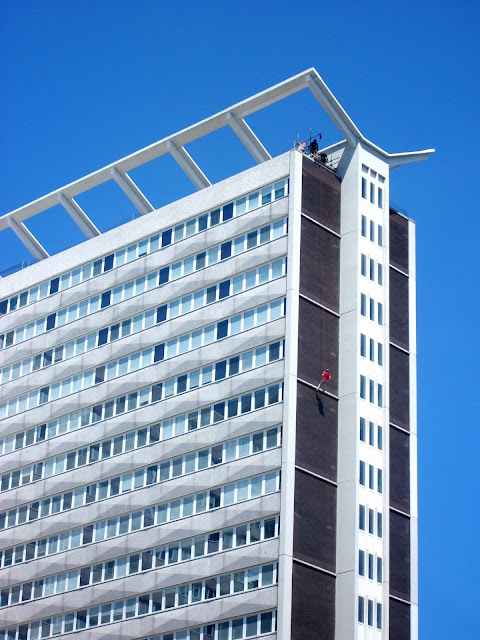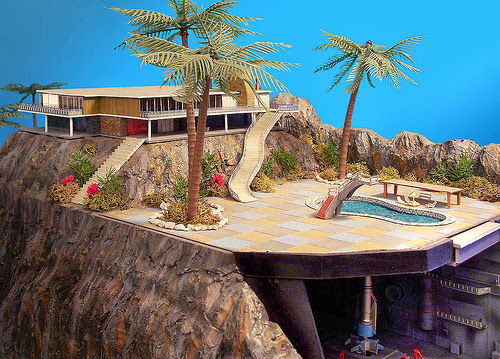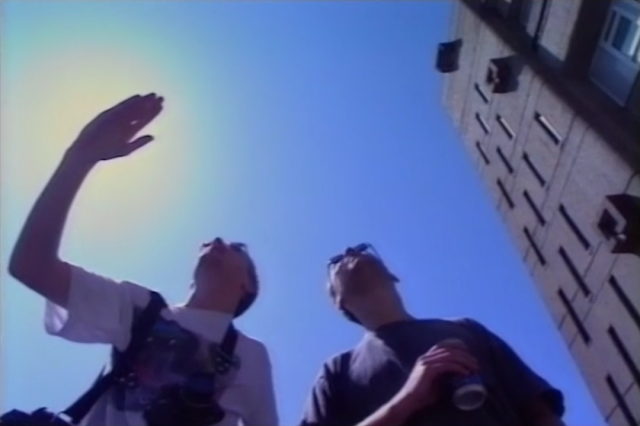Events: October 2015
I'm doing two events in October 2015.
The first is for Wakefield Civic Society on the evening of the 15th October, 7.30–9.30pm, at Wakefield Town Hall, where I'll be talking about ten buildings that changed postwar Britain. Here's an Eventbrite link for tickets.
Ten Building that Changed Postwar Britain: How did blitzed, slum-ridden and crumbling 'austerity Britain' became, in a few short years, a space-age world of concrete, steel and glass? Discover the story of Britan's postwar rebuilding in this whistle-stop tour of ten brilliant, curious or downright bizarre buildings that represent the story of this turbulent period of our history, from 1945 to 1979. Travel from the days of prefabs and the birth of the Welfare State through to the concrete brutalism and ambitious plans that changed towns and cities up and down the country. John Grindrod is the author of Concretopia, witty and revealing history of our postwar rebuilding, described by the Independent on Sunday as 'a new way of looking at modern Britain.'
'Something Concrete and Modern' is a project to document the buildings, people and planning that transformed the town and cities in the North-East of England in the years following the Second World War.
Following the Second World War, vigorous and successful building programmes were completed in the North East of England. Social housing, the introduction of new towns and the varied developments for the new industries of gas, steel and petrochemicals, all of which were booming in the post-war era, as the region found itself with money to invest and designers and politicians full of optimism for the future.
The North east region quickly became a hot bed for design attracting amongst others, Ove Arup, Victor Pasmore, Berthold Lubetkin, and his proteges Gordon Ryder and Peter Yates. During this period, the School of Architecture in Newcastle also spawned a number of important figures in the Brutalist movement, including Alison and Peter Smithson, Jack Lynn and Ivor Smith. A number of the buildings from this period became key icons of twentieth century post-war architecture: Ryder and Yates' Engineering Research Station, Owen Luder's Trinity Car Park, George Kenyon's Newcastle Civic Centre and Victor Pasmore's Apollo Pavilion in Peterlee.
Regrettably, this post-war legacy has remained largely undocumented and in recent years has begun to disappear at an alarming rate due to a lack of appreciation of the architecture from this period and little recognition of the significance of these buildings, their designers and the ideals that they were borne out of.
The Something Concrete and Modern project was established to catalogue and document the key projects and people that were influential in shaping the region during this period. As well as the catalogue and in recognition of the need to make the information more accessible to a wider audience, the project team have established an online archive which features more than 70 buildings and key figures from the period.
In this presentation the research team (Rutter Carroll, Claire Harper and James Perry) will present some of the key projects and characters from the archive. The presentation will set out the social, economic and political context that made the North east such a conducive environment for bold planning and architectural thinking. Finally, the team will present the archive and talk through how it was achieved covering the design, research and future growth of the project.
Rutter Carroll, who is a member of the research team, received an RIBA Research Trust Award in 2013 for work on this Something Concrete and Modern: Post War Architecture in the North East of England project.
Something Concrete and Modern: October 20th 2015, 6.15pm to 7.15pm. It's a free event but you need to reserve your place via the RIBA website.
Hope to see you there!
The first is for Wakefield Civic Society on the evening of the 15th October, 7.30–9.30pm, at Wakefield Town Hall, where I'll be talking about ten buildings that changed postwar Britain. Here's an Eventbrite link for tickets.
Ten Building that Changed Postwar Britain: How did blitzed, slum-ridden and crumbling 'austerity Britain' became, in a few short years, a space-age world of concrete, steel and glass? Discover the story of Britan's postwar rebuilding in this whistle-stop tour of ten brilliant, curious or downright bizarre buildings that represent the story of this turbulent period of our history, from 1945 to 1979. Travel from the days of prefabs and the birth of the Welfare State through to the concrete brutalism and ambitious plans that changed towns and cities up and down the country. John Grindrod is the author of Concretopia, witty and revealing history of our postwar rebuilding, described by the Independent on Sunday as 'a new way of looking at modern Britain.'
 |
| Engineering Research Station, Ryder and Yates 1968 © Photo-Mayo studio |
On the 20th October I'm chairing an event at RIBA in London by North-East modernist buffs Something Concrete and Modern. I'm very excited to hear what they have to say, as I'm a big fan of their work. Here's what the RIBA site says:
'Something Concrete and Modern' is a project to document the buildings, people and planning that transformed the town and cities in the North-East of England in the years following the Second World War.
Following the Second World War, vigorous and successful building programmes were completed in the North East of England. Social housing, the introduction of new towns and the varied developments for the new industries of gas, steel and petrochemicals, all of which were booming in the post-war era, as the region found itself with money to invest and designers and politicians full of optimism for the future.
The North east region quickly became a hot bed for design attracting amongst others, Ove Arup, Victor Pasmore, Berthold Lubetkin, and his proteges Gordon Ryder and Peter Yates. During this period, the School of Architecture in Newcastle also spawned a number of important figures in the Brutalist movement, including Alison and Peter Smithson, Jack Lynn and Ivor Smith. A number of the buildings from this period became key icons of twentieth century post-war architecture: Ryder and Yates' Engineering Research Station, Owen Luder's Trinity Car Park, George Kenyon's Newcastle Civic Centre and Victor Pasmore's Apollo Pavilion in Peterlee.
Regrettably, this post-war legacy has remained largely undocumented and in recent years has begun to disappear at an alarming rate due to a lack of appreciation of the architecture from this period and little recognition of the significance of these buildings, their designers and the ideals that they were borne out of.
The Something Concrete and Modern project was established to catalogue and document the key projects and people that were influential in shaping the region during this period. As well as the catalogue and in recognition of the need to make the information more accessible to a wider audience, the project team have established an online archive which features more than 70 buildings and key figures from the period.
In this presentation the research team (Rutter Carroll, Claire Harper and James Perry) will present some of the key projects and characters from the archive. The presentation will set out the social, economic and political context that made the North east such a conducive environment for bold planning and architectural thinking. Finally, the team will present the archive and talk through how it was achieved covering the design, research and future growth of the project.
Rutter Carroll, who is a member of the research team, received an RIBA Research Trust Award in 2013 for work on this Something Concrete and Modern: Post War Architecture in the North East of England project.
Something Concrete and Modern: October 20th 2015, 6.15pm to 7.15pm. It's a free event but you need to reserve your place via the RIBA website.
Hope to see you there!










Comments
Post a Comment